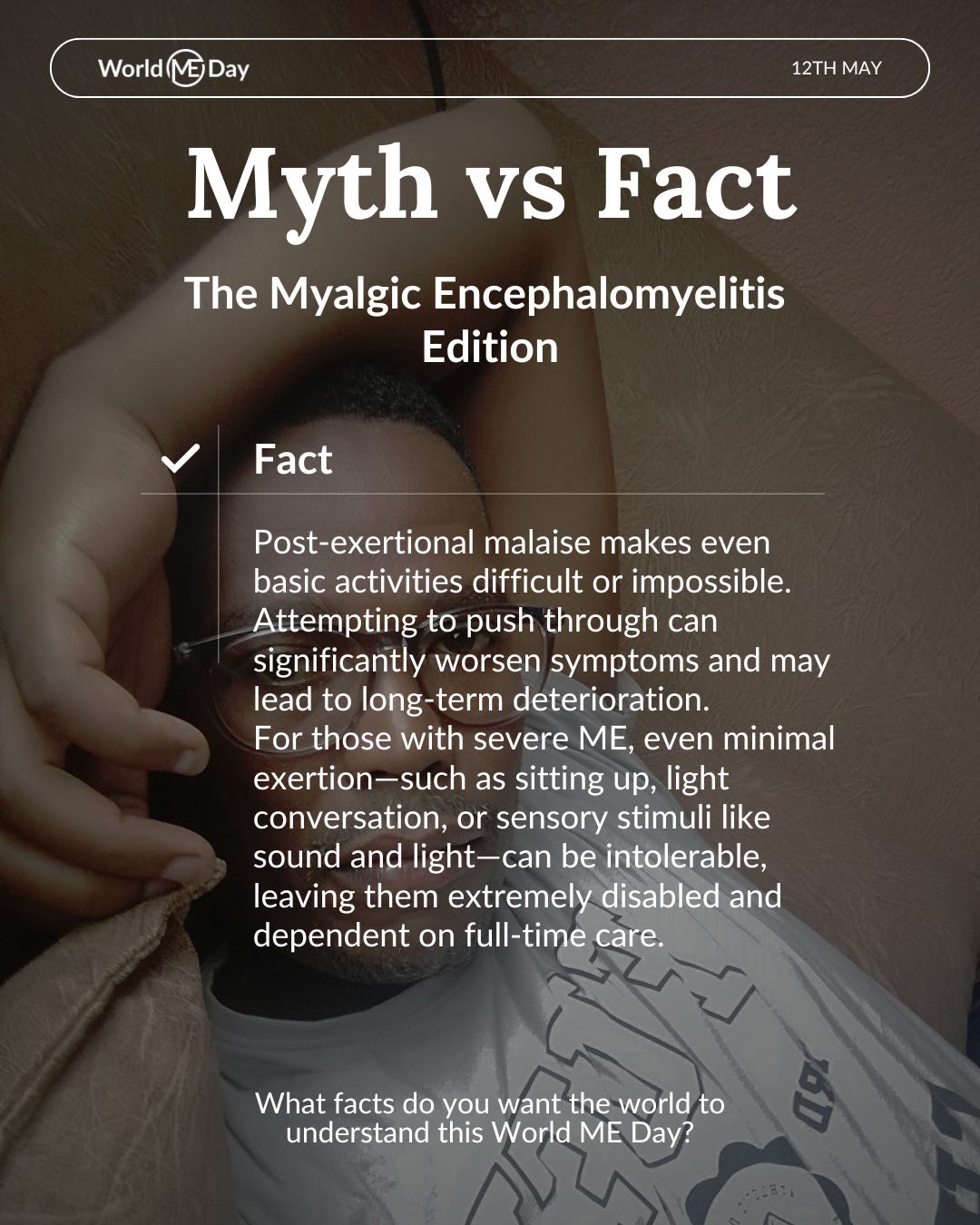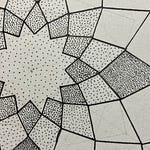Hi. Please see additional resources to learn about ME/CFS at the bottom of this post. This episode was produced as a podcast. Press the PLAY button above or read the full transcript below. Thank you for being here. Hal
Who Cares
So I missed ME/CFS Awareness Day again this year. It was May 12th. I'm just a few days late, but here we are just in time for my Substack going out on Saturday. I pulled together a couple of my friends, Emma Kitchen and Peggy Munson, and we are going to do our best to tell our story… tell a little bit of our story around this illness — in hopes of making a few people aware. So we'll jump right into the middle of the conversation between Emma and myself. Emma begins with a little story. Here she is. Emma Kitchen.
Emma
So I was an avid rock climber and at the time I became ill, at the exact time, a girl that I used to climb with had a climbing accident and became paralyzed below the waist, and she got a lot of attention (rightly so, because it's a horrific thing to have happened to her) but the whole community came around her and she got loads of get well cards, loads of support. She had journalists around her. She became like a local celebrity. And I didn't even get a get well card. You know, nobody cared at all, like they showed no care whatsoever.
And within a year, she was back at work, she had an adapted flat and she was skiing in the Alps on adapted skis and she'd written a book about her accident. She was like a local celebrity because of her accident and there was me, lying on a bed unable to speak. You know, even 13 years later, still have not been given my life back as it was. Oh, it's just so unfair, isn't it?
Also at the time in my climbing club, two people got bowel cancer. And of course, there's loads of sympathy and loads of empathy. I even spoke to them at the time because I was chronically ill, and was trying to support them through the journey, you know. And again, like, a year later, they're both fine. They're both having adventures all over Europe, and they've got their life back.
I don't know it's just… normal illnesses gain so much sympathy and support from family and friends in the local community, and then there's us with this condition, and nobody cares. Nobody bats an eyelid. And I don't understand it, because the level of suffering that goes with this condition is just obscene and we don't get any credit for it. We're just a bit tired. I'm just a bit tired. It's like, that's what gets me. Do you know what I mean? Like, all of the attention, but you get the attention, though, don't you, Hal? You do get it? Yeah, you do.
Hal
I get some attention.
Emma
Yeah, but that's such a unique experience in this community, isn't it? That your condition seems to be acknowledged and you have supportive people that care and show interest and hear you. I think that's such a unique experience. I think you would struggle to find an illness that is as isolating as this one.
Hal
I was mentioning this post and talking about ME/CFS Awareness Day, and you said, “Nobody cares about ME/CFS awareness.” Would you talk more about that?
Emma
(lol) No. I said, “the only people that care about ME day is people with ME.” Like, nobody cares. Do they?
Hal
Say more about that? Like, what's your what's your experience about nobody caring?
Emma
My personal experience of nobody caring is that nobody has shown me that they cared. So only my mum, because I live with her and she's my carer, has taken an interest. None of my family have even bothered to find out what the condition is, shown any kind of concern or interest. My friends the same. It's just nobody cares. Doctors don't care. Nobody knows what it is. Just nobody cares.
I mean, if you had that experience though of nobody caring or… you haven't, have you? You haven't had that experience.
Hal
Well, it's easy when I'm home alone at night in this big house all by myself, it's easy to start thinking that nobody cares, but I do have a nice handful of people that care a great deal.
Emma
Yeah, I suppose that's because you were such an important part of your community. But for people who haven't had that big social life. When you go into this illness, you know, it's just so isolating and you just feel so uncared for and unsupported, and it’s just…
Hal
What's something people could do to show you that they care?
Emma
I mean, just a quick Google on what the condition is that would be a great start.
Hal
Yeah, a quick Google. All right, everyone, that's that's your assignment for the day. A quick Google.
Emma
What about for you?
Hal
I don't know.
I was just thinking today. It's such a gorgeous day outside and I was thinking. Who wants to think about ME/CFS? It's such a depressing subject. People are out enjoying their lives. So, I guess what I would hope is that people take a few minutes to read this post. (see additional resources below) And I guess I want people to know that even though the weather is great outside, there are still many of us living in bed with this illness.
Emma
Do you know, I think what's so hard is it's so hard to explain how awful it is. It's so hard to explain how it feels in the body. It's impossible to even describe it to a doctor. You know, it's just so isolating, because it's so hard to share the experience of what it is.
You know, I remember I went to see a specialist. This is a “specialist,” air quotes around that. And he was like, “so I believe you're feeling a bit tired,” and I'm like, “No, I've just spent the last year unable to go to the toilet, unable to speak, unable to chew food, unable to sit up, unable to have daylight in my room. And you're just saying I'm feeling a bit tired.” And that's the specialist.
That's British, that's British healthcare smashing through. And it's terrifying. It's terrifying to be this ill and to have nobody supporting you and holding you in any kind of nurturing medical… you know, what's the word? I don't even know what the word is.
Hal
Well, Emma, it's great to hear you talk about this. I just listened to the recording of Peggy Munson. She sent it to me. It's a pretty intense picture of what it looks like for many people who don't have the care that they need.
Emma
Yeah. It's a similar picture here, though, as well.
Hal Walker
I know. Everywhere. Imagine, imagine other countries. Is this a worldwide illness, Emma? Or is this mainly just in England and the US?
Emma
From what I understand, it's very heavy in the Western world. It's more present in the Western world, but it is everywhere. It's weird, isn't it? And it kind of exploded from nowhere in the 80s. It’s such a weird thing.
I can't wait for them to find out what it is, just for that validation, you know, that's probably all I hope to ever really receive in my lifetime, just the validation, instead of being treated like I'm some kind of, you know… hypochondriac.
Hal
Emma, let's listen to Peggy's thing, and we'll come back and finish this off after we listen to Peggy.
Emma
Alright, let's go for it
Peggy Munson
This early May marks my 33rd year of getting sick with postviral ME/CFS and May 12th was also International ME/CFS Awareness Day. Thirty-three years of this illness is such an impossible hell to quantify. Even in my best intentions of writing a blog post about it, I could not pull it off for today, but will try in the coming weeks and months.
Most of those 33 years have been spent in some reclined position, usually my bed, feeling sick on a deep cellular level most of you probably can’t imagine unless you have the misfortune of suffering from Long Covid. For a large part of that time, I couldn't even have people too close to me and talking to me due to extreme sensitivity to sensory stimulation that leads to brutal neurological symptoms. For sixteen years, I have been almost completely unable to talk on the phone except to leave messages or record text audios. For over a quarter of a century, I have been unable to travel any real distance.
Despite how extreme these symptoms and my dozens of others are, my family has utterly refused to be my caregivers for 33 years. And for almost two decades now, they have followed the advice of terrible, unconscionable therapists and tried to extinct any mention of my illness. The resulting estrangement from my family is what led to my full dependence on Medicaid services, the same ones that could be cut any time, as Medicaid is the primary source for all nursing home and in-home care in this country.
Any cuts to Medicaid programs that affect disabled people will simply end the lives of those of us desperate enough to need these programs. Right now, somewhere between 700,000 and 800,000 people in the US are on wait lists to get on the personal care attendant (PCA) waiver I use for primary caregiving, to simply stay alive. These are all people who qualify for Medicaid and have extremely-limiting illnesses and disabilities, and many, if not most, will wait years to get care they need urgently, like tonight. To cut such Medicaid programs isn’t even “soft” eugenics: it’s just eugenics. Please make no mistake about how urgent and serious this is, including for anyone you know in a nursing home as it’s likely Medicaid-funded.
The “best” thing about being this disabled is learning what it is to be disabled and how senselessly (in the US at least) people are forced into unsurvivable circumstances because of it, from the sub-poverty wages of SSI and SSDI, to the utterly absurd hardship of getting on the PCA program, to the insane caregiver shortage that completely relies upon unpaid family caregivers to willingly step up.
Please honor my “sickerversary” and ME/CFS Awareness Day with me by watching some ME/CFS awareness videos on YouTube, and educating yourself about the current care crisis in America and what cuts to both social security and Medicaid could mean for disabled Americans.
Mostly, I just want to say that whatever any of you are going through, you are much stronger than you think. I am a survivor of thirty-three years of unimaginable torture inflicted by an illness that is underfunded, underrecognized, and totally incurable at this point. When I passed the 3-year and then 7-year mark – already significant in the 1990s – I knew already that less than 4 percent of people significantly recovered from severe ME/CFS after that point – stats I now see Long Covid patients throwing around. I still hoped and tried everything imaginable to get better and recover, but the best advice I heard recently from an ME/CFS patient is that radical acceptance and not clinging to an idea of reclaiming one’s former self is the only way to go forward without further injury and I take that to heart every day. I accept this is my life, and I do whatever I can to make meaning out of it.
Hal
Wow. Thank you so much, Peggy Munson. Thank you so much for sharing. I think you already know this, Peggy, but you're my hero. Ever since I met you, I've just been amazed at your ability to survive so beautifully with such challenging circumstances. The fact that you keep going the way you do keeps me going as well. Thank you.
So Emma, Peggy ended with this idea that in order to avoid further injury, we need to have acceptance and let go of our former self. What do you think about all this?
Emma
Yeah, I mean, what a powerful way to to end her message. And I agree. I agree completely. I think it's the only way. And for me, you know, it was just… see, I don't know if I want to talk about it… I don't want to say that. But no, I don't… (lol)
Hal
Go ahead, Emma! You're doing great.
Emma
I was just thinking about how before I found acceptance, for me, it was suicide. You know, that was the only thing that gave me any relief, thinking the fact I could kill myself, that was the only thing that kept me going, was knowing that I didn't have to keep going. And now, you know, I reached a place of acceptance, and it wasn't until I'd reached that acceptance.
But coming to acceptance is such a painful process. It's such deep grief work, and it's terrifying. And I put it off for so long, just clinging to hope that something was going to change. I was going to get better. And like Peggy, you know, she's on call seven years, and that was, it was like that for me. I was like, God, God Almighty. It's like nine years, 10 years, you know, 13 years. And I don't know you, just at some point you just have to come to the realization that this is your life. And I think as soon as you reach that place, it's almost like you can start seeing the beauty of life again. Because it's almost like, while you're putting out kind of hope that something's going to change. You miss this very fine, delicate aliveness that can be felt even in a sick body, and once that gateway to acceptance has been walked through, as painful as it is, you can become alive again, even in the most challenged and restricted body, there can be life and vitality discovered. And it can open up a new experience of life.
I say to my friend who has M.S., it's like, it's not that you've got a worse life now. It's just it's a different life, and as soon as you can get your head around the fact that it's different and let go of the life that it was, you know you're going to suffer, but as soon as you come into that acceptance of a different life, right?
Hal
That's what that's what Peggy says. She says, “not clinging to an idea of reclaiming one's former self is the only way to go forward.”
Emma
Yeah. So powerful. Yeah. She said it much more succinctly.
Hal
Well, Emma, this has been great. This is ME/CFS Awareness Week, as far as I'm concerned and we are doing our little part in spreading the word about all the people out there who are not getting the care they need. Thank you Emma.
Emma
Thank you, Hal and thank you, Peggy.
Hal
What are three things that people can do today to to help spread the word. Like Peggy says, “look up some YouTube videos on the subject.” I need to find one to share with everybody.
Emma
Yeah. I mean, that's what's that film. Is it “Unrest.”
Hal
Yeah, watch “Unrest.” That's a great way to find out more.
Emma
Please watch it..
Hal
Please watch “Unrest.”
Emma
Also check out Whitney Dafoe. I mean, have a look at how bad this can get. Because people just hear the word fatigue and shut off. It's not about being tired.
Hal
I'll share Whitney's post too in this thanks, Emma. Thanks, Peggy, thanks everybody. Hey. We're wrapping it up here. Episode 111. Yeah, hey, remember, you live in a body. You have a body. Yay! I have a body. I’m gonna love it. I’m gonna enjoy it. Whatever you got. Love it. Because it's not going to be here forever. Thank you so much for being here. Thank you for listening and have a good day. Have a good week. Bye.
Learn more about ME/CFS below:
World ME Alliance
Whitney Dafoe’s Substack
“Unrest” Documentary
Open Medicine Foundation
Donate here.
Our Vision
Open Medicine Foundation (OMF) envisions improved health care for patients suffering from multisystem chronic, complex diseases with collaboration between patients, clinicians, and researchers.
Our Mission
Support collaborative medical research to find effective treatments and diagnostic markers for chronic complex diseases with initial focus on Myalgic Encephalomyelitis / Chronic Fatigue Syndrome (ME / CFS).
Keep the engaged community, clinicians, and researchers informed about OMF research projects and results.
Bring together “thought leaders” from around the world to brainstorm and participate in targeted initiatives.
Encourage and engage the patient community to take an active role in their health care.
Support health care education about chronic complex disease.
Advance translational research and information-based research into optimum clinical medicine, including the diagnosis and treatment of these poorly understood diseases and the under-served patients.




















